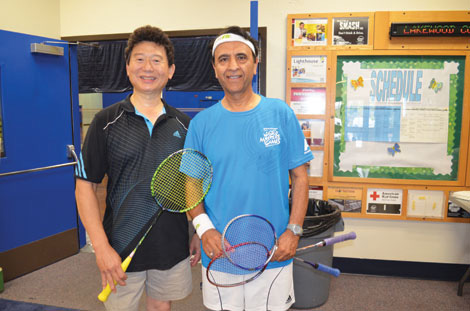After 50, age is just a number for these athletes
The only requirement to take part in the Washington State Senior Games is that participants be 50 years of age by the end of the year of the event.
But it helps to have a lot of enthusiasm and interest in staying active, which is exactly what the competitors brought to the 2017 games.
Jack Kiley, president of the Senior Games, a non-profit organization, said this was the 21st year of running the largest Olympic-style multi-sport event in Washington. Competition for the 2,000 participants took place at various sites through the South Sound,.
Washington got on board with the Senior Games in 1996 when a couple moved here from Pennsylvania. “They had been active in the Senior Games in that state and found we didn’t have one and started things rolling,†said Kiley.
The Washington games started with a few participants and a couple of events, and today they are up to 24 sports staged in Olympia, Lacey, Tumwater, and various parts of Pierce and Mason counties during the month of July.
Games include archery, basketball, badminton, bowling, cowboy action shooting, cycling, dance, disc golf, golf, pickle ball, power walking, race walking, racquetball, 5 and 10K runs, rock climbing, shuffleboard, soccer, softball, swimming, table tennis, tennis, track and field, trap shooting, triathlon and volleyball.
On July 30, the badminton competition, hosted by the Tacoma Badminton Club, was held at Lakewood Community Center. The athletes were excited and ready to play, proving to everyone that badminton is more than just a backyard sport.
Titian Niosi of Bremerton, who plays badminton at the center on a regular basis, was taking charge of keeping things on track as a volunteer coordinator during the Games competition. He kept busy making sure all participants knew when and where they were scheduled to play.
Patrick Ip came to watch and cheer on his wife, Katherine, in the women’s doubles. Meanwhile, Hentley Liem of Seattle and his partner, Ike Abbasi, teamed in one the men’s events.
Abbasi traveled to New Zealand recently to play in the World Master Games and came home with a gold medal in singles, a silver medal in men’s doubles and a bronze in mixed doubles.
Joe Moelders started running the show for the badminton event when Kiley asked him to help out a number of years ago. Moelders he and his wife welcome everyone and make sure everything is in order with sign-in sheets, scorekeepers, and snacks and juice on hand for competitors and guests.
Moelders is passionate about the Games and belongs to the Lakewood Badminton Club, playing once a week on Mondays.
“I don’t watch much TV,†he said.
Moelders said in the beginning, badminton in the Games started out with about eight or 10 participants. “I made it my duty to inform people who were part of the badminton club that I run, and the interest skyrocketed,†he said. “We had 15 people the next year, then 20 and 40 people last year, which was a qualifying year for the Senior Games on the national level.â€
Every other year is a qualifying year for the Senior Games.
Kiley said participants don’t need to be a top athlete or even have participated in sports all their lives. Everyone is welcome.
“The goal is to get seniors off the couch and get them involved,†Kiley said. “A good number of our participants are constantly thinking about their health and quality of life, but what we are really here for are those that are doing too much TV and too much on the couch.â€
The Washington State Senior games are an all-volunteer organization. More information is available at http://washingtonstateseniorgames.com/index.htm.
